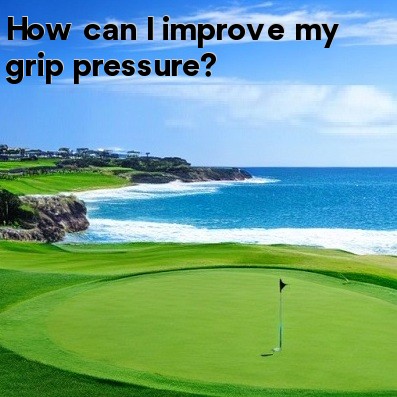
How to Improve Your Grip Pressure in Golf
Grip pressure is a crucial aspect of the golf swing that can greatly impact your performance on the course. Finding the right balance of grip pressure can enhance your control over the club and lead to better shots. Here are some tips to help you improve your grip pressure:
- Relax your hands: One common mistake is gripping the club too tightly, which can restrict your swing and cause tension. Instead, focus on relaxing your hands and fingers before gripping the club. This will help you achieve a lighter grip pressure.
- Use a neutral grip: Make sure your grip is not too strong or too weak. A neutral grip allows the club to naturally return to square at impact. Place your hands on the club in a way that the “V” formed by your thumb and index finger points towards your trailing shoulder.
- Experiment with different grip sizes: Everyone's hands are different, and it's essential to find a grip size that suits you. Grips that are too thin can cause excessive grip pressure, while grips that are too thick can lead to a lack of control. Experiment with different grip sizes to find the one that feels most comfortable and allows for a relaxed grip pressure.
- Practice with a towel: To get a sense of how much pressure you are applying, practice swinging with a towel held under your grip. If the towel falls during your swing, you might be gripping too tightly. Repeat this exercise to develop a lighter grip pressure.
- Utilize training aids: Various training aids are available to help you improve your grip pressure. Grip trainers and grip pressure sensors can provide valuable feedback on your grip strength and help you find the right pressure for a more consistent swing.
- Focus on the last three fingers of your lead hand: The grip pressure primarily comes from the last three fingers of your lead hand (left hand for right-handed golfers). Keep your grip pressure light with these fingers while allowing the index finger and thumb to have a gentler grip.
- Monitor your grip pressure during the swing: It's important to maintain a consistent grip pressure throughout the entire swing. Be mindful of any tension building up in your hands and consciously try to keep your grip pressure light and relaxed from start to finish.
- Take breaks: Gripping the club for an extended period can lead to fatigue and increased grip pressure. Take short breaks between shots to give your hands and fingers time to relax and recover. This will help you maintain a lighter grip pressure throughout your round.
- Stay mentally calm: Nervousness and tension can lead to a tighter grip. Practice relaxation techniques, such as deep breathing and visualization, to stay mentally calm on the course. By keeping a clear and relaxed mind, you can better control your grip pressure.
Conclusion:
Improving your grip pressure in golf is an ongoing process that requires practice and awareness. By following these tips, you can develop a lighter and more controlled grip, leading to improved performance and consistency in your game.





